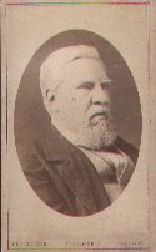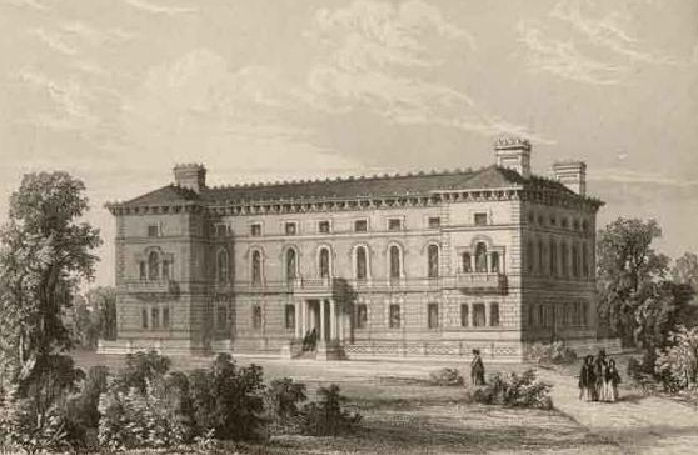

JOSEPH SOUL - A MAN OF CONSCIENCE

Joseph Soul
by Maureen Storey
This article was originally published in the August 2013 edition of Soul Search, the journal of The Sole Society
In the National Portrait Gallery in London there is a painting by Benjamin Robert Haydon that depicts the World's Anti-Slavery Convention held in London in 1840. The convention was organised by the British and Foreign Anti-Slavery Society (BFASS), which was founded in 1839 with the aim of eradicating the global slave trade and slave systems its prime targets were the West Indies, British India and Ceylon, Brazil, Cuba and the USA. In the painting, just to the right of the speaker and near the back of the hall, is a delegate who has been identified as Joseph Soul. Several of Joseph's letters concerning the BFASS survive in its archives and these demonstrate how deeply Joseph was involved in the Society's work at the time of the convention. So, who was Joseph?
He was born in Long Alley, Shoreditch, Middlesex, on 14 November 1805 and was the seventh of the ten children of Eli and Elizabeth (neι Hodges) Soul. Although Joseph and most of his older siblings were baptised at St Leonard's, the local parish church, the family had strong non-conformist leanings and attended the Tabernacle Chapel in Finsbury Middlesex.
Joseph married Ann Simmonds at St Brides, Fleet Street, in 1830 and they settled in Clerkenwell where they had seven children between 1833 and 1848. Joseph's occupation was given as 'bookseller' on his daughter Mary Ann's 1837 birth certificate but in 1840 he took up the post of secretary to the Orphan Working School, a position that he was to hold for 36 years. Although still a committed supporter of the anti-slavery movement, Joseph resigned from the BFASS in 1845 so that he could devote more time to his work for the Orphan Working School.
The Orphan Working School was founded in Hoxton, Middlesex, in 1758 by a group of 14 men led by Edward Pickard, a dissenting minister, and initially provided accommodation and training for 20 boys and 20 girls aged 7 to 14. In 1775 the school moved to larger premises in City Road, Clerkenwell which housed 70 pupils. The school was still on this site when Joseph took up his post, but by 1847 it had again outgrown its buildings and the decision was made to move further out into the suburbs. A site was found at Haverstock Hill and a new school that could accommodate 400 children was built. When it was founded the emphasis of the school was to equip the children for their future working lives: they often undertook heavy manual work and received very little in the way of an academic education. However, as public attitudes to educating the poor changed the emphasis at the school also changed so that by 1870 the children received instruction in English, history, geography, scripture, mathematics (but only for the boys!), drawing and singing, as well as some vocational training. At the end of their time at the school, the children were helped to find suitable jobs or apprenticeships and were given a bible and clothing to the value of £3 3s. In addition, if the school received a good report from their employers the children received a small sum of money a year after leaving the school.

The Orphan Working School at Haverstock Hill
Whilst still working tirelessly to expand the Orphan Working School Joseph next turned his attention to the plight of younger orphans: the Royal Alexandra Orphanage for Infants was set up in Hornsey and the Royal Albert Orphan Asylum was built at Albert Hill, Holloway. The Royal Alexandra Orphanage was organised on a 'house' system so that the children grew up in 'families' rather than in one group. It was something of a family project as Joseph's daughter Elizabeth became the honorary secretary to the Women's Committee that supported it. The Royal Albert Orphan Asylum, which was intended for children between 5 and 8, was founded in 1867 with Joseph as its first Honorary Secretary. One of Joseph's major coups was to secure the patronage of Queen Victoria and the Prince and Princess of Wales Queen Victoria planted a tree in the grounds during the inauguration ceremony.
Joseph is also credited with being the driving force behind establishing a convalescent home in Margate for children from the school and orphanages and again secured royal patronage this time from Princess Mary and the Duke of Teck.
The school and orphanages were run entirely by public subscription and raising funds for them formed a large part of the secretary's work. Although there was enough room for 400 children at the Haverstock Hill site, for a number of years the number admitted was restricted to about 300 because the school did not have the means to support more children. Joseph placed many letters in the newspapers asking for donations of which the following is a typical example:
Morning Post: 22 Oct 1863
Sir, - As the devout and affluent are about to be called upon to contribute at the various churches and chapels at some special thanksgiving services, may I respectfully but earnestly entreaty that a portion of the collections be reserved for the benefit of the widow and the orphan (Leviticus xvi 11-14), represented by the Orphan Working School at Haverstock-hill, which now has to clothe, educate, and wholly maintain nearly 300 poor orphans and other necessitous children.
Sixty children are annually admitted. Thirty will be elected next week from a list of 129 candidates; but though the charity provides for 300, yet 400 might be accommodated but for want of the requisite funds.
Cases of the most distressing nature are constantly presented for admission but the committee are obliged to limit the admissions to 60 in the year for the reasons stated. In the 105 years since its foundation 2,129 orphans have been received.
Commending the object to your readers for personal as well as other help, I remain yours obediently,
Joseph Soul, Secretary
Joseph was presented with a testimonial for his work on 8 January 1867 in a ceremony held at The London Coffee House and attended by 50 friends and supporters of the school. He was presented with a plaque and a gift of 550 guineas which had been given by the friends of the school. During the presentation Joseph was credited with being the driving force behind the expansion of the school and the campaign to raise funds for its upkeep an example given of the latter was a bazaar that had recently resulted in a profit of £1700 and donations of a further £500.
In his spare time Joseph enjoyed writing poetry and a couple of his poems appeared in the newspapers: one with an anti-slavery theme, entitled 'To Dr Madden, on his Leaving England for Africa' and one about the nation's grief on the death of Prince Albert, entitled 'The National Loss'.
On his retirement Joseph was presented with an inkstand the inkstand was later given back to the school by Geoffrey Bruce Soul, one of Joseph's great grandsons, and is believed to now stand on the governors' boardroom table.
Joseph Soul died on Christmas Day 1881, aged 76, and was buried in Abney Park Cemetery in Stoke Newington, Middlesex.
Postscript: The Orphan Working School later became the Royal Alexandra School and in 1949 was amalgamated with the Royal Albert School (formerly the Royal Albert Orphanage) to become The Royal Alexandra and Albert School. The school is one of the few boarding schools in the UK that is run by the government (the government pays for the education and parents pay the costs of boarding) and is currently sited at Gatton Park, Reigate, Surrey.